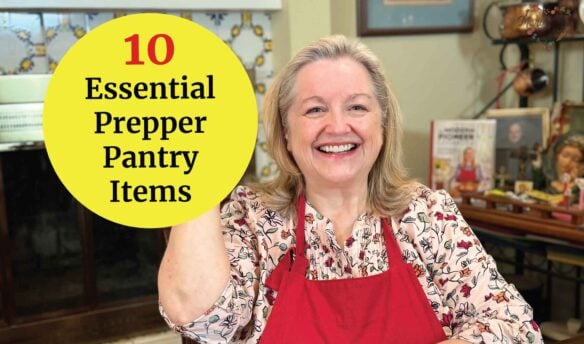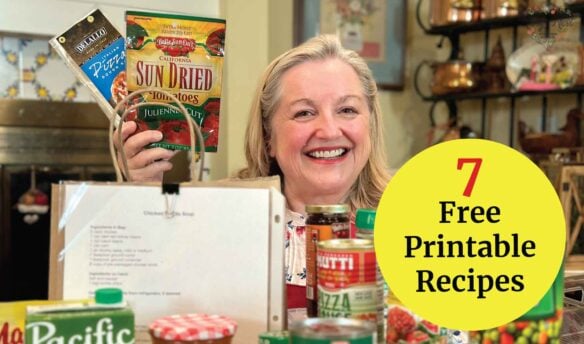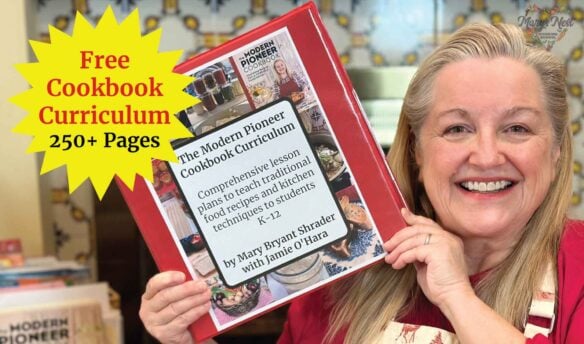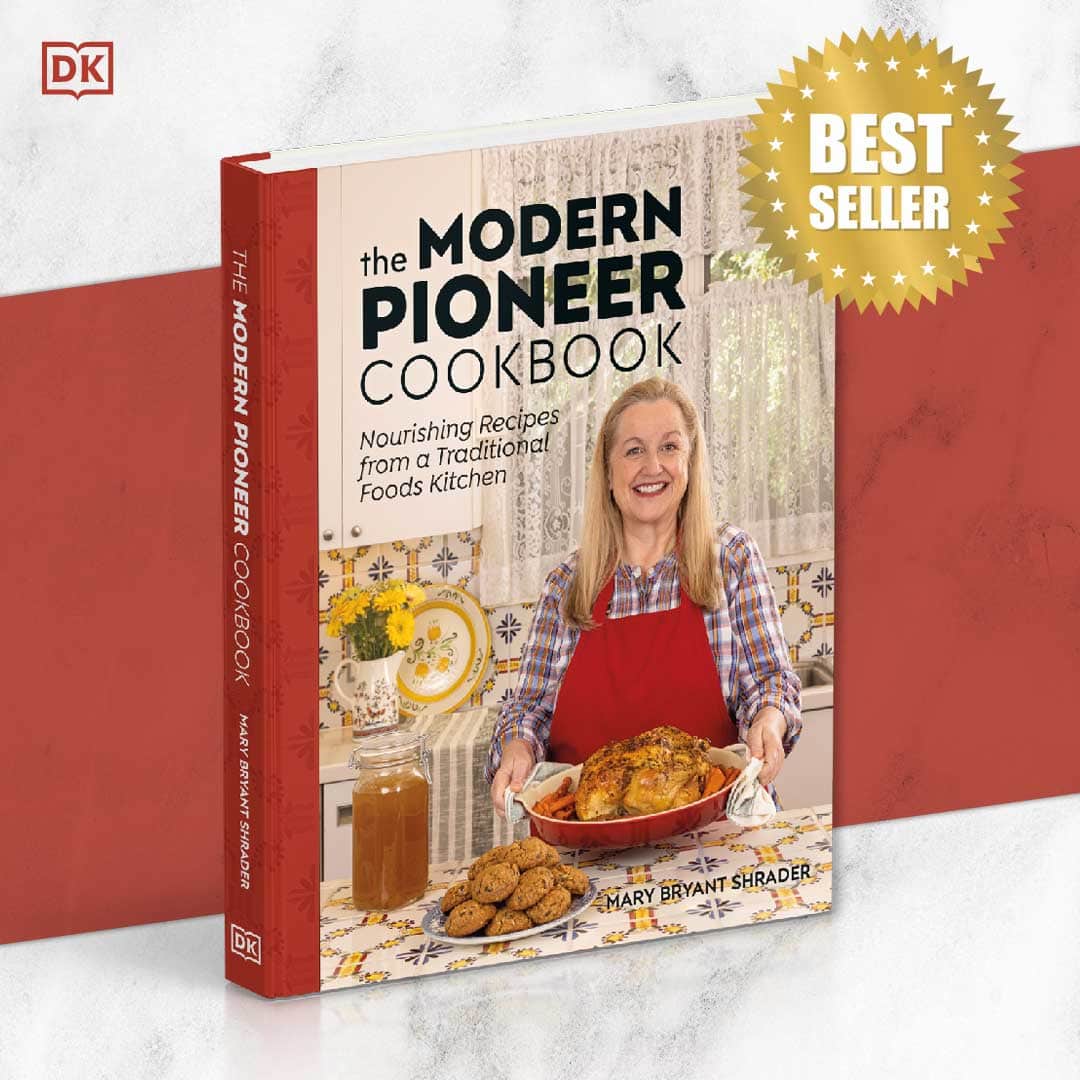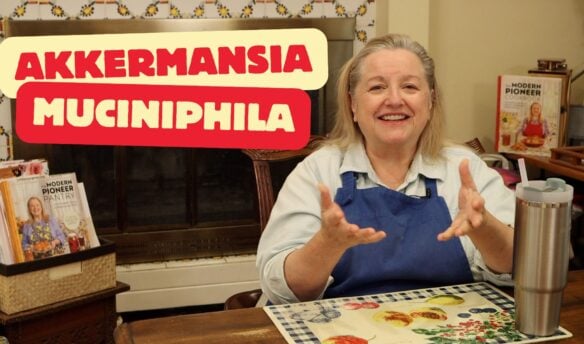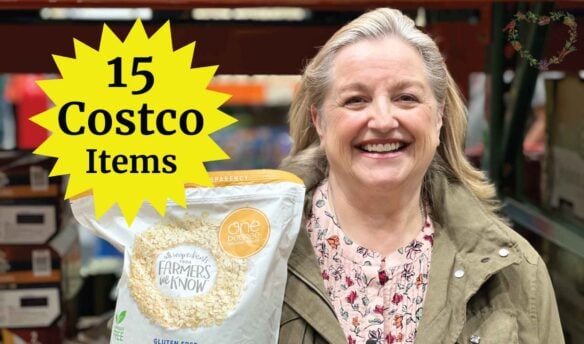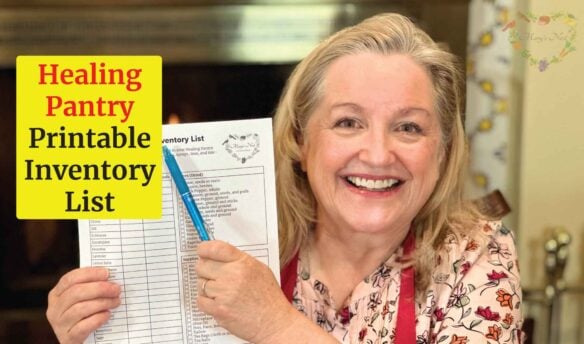Along with the news about rising inflation and other economic uncertainties, the topic of price controls has been making headlines. As modern pioneers in the kitchen, we need to be ready for anything—especially when it comes to feeding our families. Today, let’s talk about price controls, what they are, and how you need to stock these 3 essential foods for your pantry that would be the most affected by price controls.
So watch my 3 Essential Foods to Stock Now video below and learn more about price controls and how to prep your pantry if these controls are reinstated here in the United States or in other parts of the world. You’ll learn what to stock and why you need to update your pantry now to safeguard your food supply.
Affiliates note: As an Amazon Associate I earn from qualifying purchases. My content may contain affiliate links to products and services. If you click through and make a purchase, I’ll receive a small commission. It does not affect the price you pay.
Table of Contents
- What Are Price Controls?
- The 3 Essential Foods to Stock NOW Video
- What Is The Four Corners Pantry?
- An Inside Look at the Extended Pantry
- Four Corners Pantry Tip
- Focus on These 3 Shelf-Stable Essentials
- Additional Non-Perishable Foods to Stock
- Don’t Forget Non-Food Items
- Preserve What You Can
- A Well Stocked Pantry is Power
- Prepper Pantry Videos
- Free Downloads
- Learn More About Price Controls
- The Modern Pioneer Cookbook
- Download Your Free 36-Page Pantry List
- Join the Traditional Foods Kitchen Academy
- Kitchen Academy Videos
- Shop for items used in this blog post or video
What Are Price Controls?
Price controls are government regulations that set a maximum or minimum price for goods. These measures can be implemented during times of crisis, such as war or economic downturns, to prevent prices from skyrocketing beyond what people can afford. While that may sound helpful on the surface, price controls often come with unintended consequences, like shortages, rationing, reduced product quality, and disruptions in supply chains.
Now, we modern pioneers know that the best way to deal with uncertainty is to be prepared! That’s where a well-stocked pantry comes in. Whether price controls become a reality or not, having a good supply of food and household essentials is vital to weathering any economic storm.
The 3 Essential Foods to Stock NOW Video

What Is The Four Corners Pantry?
When I use the term pantry, I think of this as much more than the everyday pantry you might have in your kitchen. For me, the term pantry refers to what I call the Four Corners Pantry.
A Four Corners Pantry has, as the name implies, four corners. These corners refer to where we store food and supplies to keep our traditional foods kitchens and homes well stocked. We want to store most everything we will need to see us through our everyday lives, as well as to be prepared for unexpected events, such as bad weather, illness, job loss, tight budgets, supply chain problems, and yes…possible price controls.
These four corners are:
- The Working Pantry—where we store the non-perishable foods we access on a daily basis.
- The Refrigerator—where we store perishable foods, including ferments.
- The Freezer—where we store perishable foods to extend their freshness.
- The Extended Pantry—where we store backup food and supplies. The Extended Pantry is often nicknamed The Prepper Pantry, and it contains multiple subpantries.
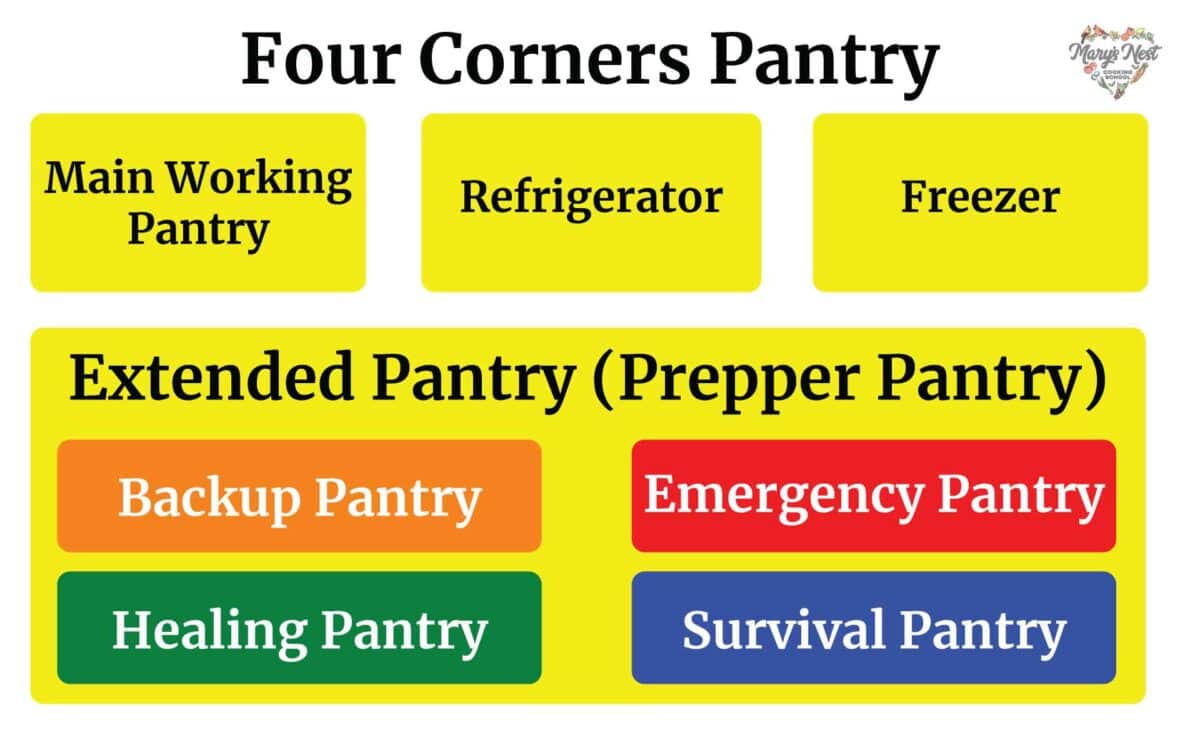
An Inside Look at the Extended Pantry
The Extended Pantry or Prepper Pantry has four sub-pantries. These include:
- The Backup Pantry—where we store non-perishable foods that we can use to restock our Working Pantry when supplies run low.
- The Emergency Pantry—where we store two weeks’ worth of non-perishable food (and supplies) that can we can prepare without electricity, clean running water, or both.
- The Survival Pantry—where we store non-perishable foods that have an extended shelf-life or are considered to be Forever Foods (those foods that basically have an indefinite shelf-life). These are foods that can see you through in the event of a longer-term crisis. Your survival pantry should be stocked with foods that have a long shelf life and provide maximum nutrition.
- The Healing Pantry—where we store the ingredients and supplies we need to make home remedies. This area can also include what I call The Herbal Medicine Cabinet, where we store non-perishable home remedies so they are easy to access when needed.
Four Corners Pantry Tip
To ensure you use the oldest products first, practice First-In-First-Out (FIFO) to manage your pantry inventory.
Focus on These 3 Shelf-Stable Essentials
Now that we understand the Four Corners Pantry, let’s focus on the essential foods we need to stock up on right now to prepare for the possibility of facing price controls in the future. These controls are likely to be imposed on staple foods that form the foundation of many household recipes in a misguided effort to keep these common foods available and affordable.
When preparing your Four Corners Pantry for possible price controls or economic instability, focus on long-lasting, shelf-stable foods. These foods will see you through difficult times without requiring refrigeration or freezing. Here are the three categories of foods that will most likely be affected if price controls are reinstated, so be sure to stock them in your pantry:
- Category 1: Whole Grains and Legumes (and Lentils): Stock up on oats, white rice, barley, and a variety of wheat berries, including modern-day wheats and ancient wheats, such as einkorn, emmer, and spelt. These grains last a long time when stored properly and can be the foundation of numerous meals and baking projects. Packed with protein, beans and lentils are a pantry staple since they are economical and nutritious. Keep a variety of them on hand, such as black beans, pinto beans, and red lentils. As with whole grains, when stored properly, they can last a very long time.
- Learn more: How to Cook Dried Beans – The Right Way!
- Category 2: Flour and Baking Supplies: All-purpose flour and bread flour (in which the bran and germ have been removed), white cane sugar, salt, baking powder, and baking soda are all essential for keeping your kitchen running smoothly. Don’t forget packaged yeast if you bake bread, or you can keep a sourdough starter on hand as a natural leavening agent.
- Learn more: How to Store Whole Grain and Make Homemade Flour
- Category 3: Canned Goods: From tomatoes to vegetables and fruits to chicken, fish and meat, canned goods are an excellent way to ensure you have access to vital nutrients if fresh produce becomes scarce or too expensive. And remember, don’t turn your nose up to sardines! I have a recipe that you will love.
- Learn more: The Best Sardines Recipe for Canned Sardines
Additional Non-Perishable Foods to Stock
The three essential categories described earlier are those foods that have historically been affected by extreme price controls and may be again in the future. So, it is wise to learn from history and focus on stocking up on those specific items. However, are there additional foods you can stock too?
Sweeteners Example
Keep in mind that depending where you are on your traditional foods journey, you may think that you don’t need to stock up on white cane sugar, for example. However, remember that plain old table sugar can often come in handy for home canning projects as well as feeding a sourdough starter. So, if in the future, sugar was not available, you will have some in your pantry to see you through.
However, as traditional food cooks, we also want to make sure that we have the alternative sweeteners that we like to have on hand including those such as Sucanat or Rapadura (brand names under which unrefined whole cane sugar are sold), maple sugar, coconut sugar, and honey. And don’t forget to stock molasses and learn how to cook and bake with it. It’s nutritious and usually in plentiful supply when other forms of sweeteners might be tough to come by.
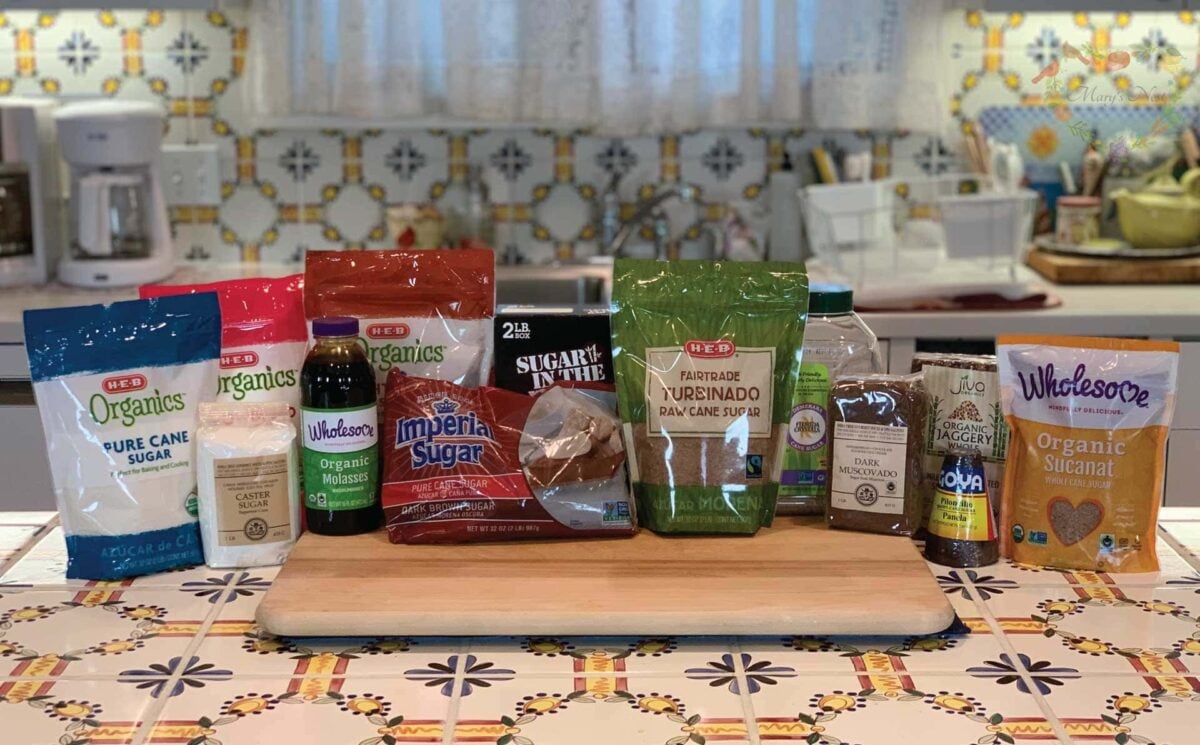
List of Additional Foods That May Be Affected by Price Controls
Here is a list of non-perishable foods to think about stocking up on now. Even though they may not be as affected by price controls as the three essential categories I described earlier, they may experience some level of price controls, rationing, and shortages:
- Dairy Products: These shelf-stable products include whole and fat-free powdered milk, dehydrated or freeze-dried butter, buttermilk, and whey, which are shelf-stable powders that retain most of their nutrients. Stocking up on these products now helps you guard against future price controls because these products offer long-term storage and versatility, and you can use them as substitutes for fresh dairy when supplies become limited. These products are lightweight and easy to store, and you can reconstitute them when needed, making them a valuable addition to any well-stocked pantry.
- Dried Fruits and Vegetables: These versatile additions to your pantry offer nutrition and variety to your meals. Dried fruits make an easy snack and are helpful when baking, and you can easily add dried vegetables to soups or stews or reconstitute them to make a quick side dish.
- Fats and Oils: Oils, such as olive oil, coconut oil, and ghee, can have a long shelf life when stored properly. Consider fats like lard or tallow if you’re farther along on your traditional food journey, as they can be rendered and stored for long-term use.
- Natural Sweeteners: Stock up on those sweeteners you like, including coconut sugar, honey, maple syrup, molasses, and unrefined whole cane sugar. These natural sweeteners can last indefinitely if stored correctly, and you can use them for baking, sweetening beverages, or even medicinal purposes.
- Nuts, Nut Butters, and Seeds – Many varieties of nuts and seeds are nutrient-dense powerhouses packed with healthy fats, protein, fiber, and essential vitamins and minerals. Stocking up on these is a wise move, especially before times of price controls or supply shortages, because they offer a long shelf life when stored properly, and you can use them to provide an energy-boosting snack or as an ingredient for meals or baked goods. The versatility of nut butters, especially peanut butter, allows you to use these butters in everything from baking to salad dressings, making them a valuable and nutritious addition to your pantry.
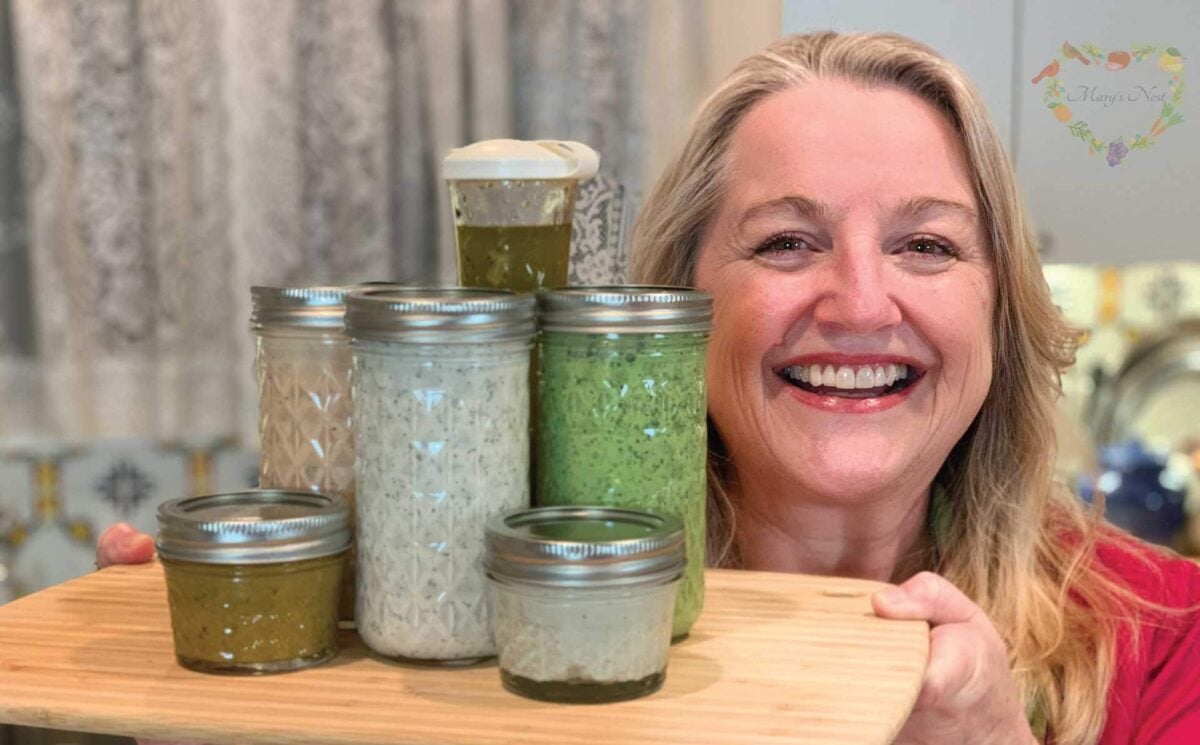
Don’t Forget Non-Food Items
While food is essential, don’t overlook the importance of non-food items that are critical for running your household. In times of price controls, these items can become hard to find or expensive, so stock up now on things like:
- Soaps and Detergents: Stock up on natural soaps, shampoos, and dishwashing liquid.
- Paper Products: Toilet paper, paper towels, and napkins. Or make sure you have plenty of reusable cloth options on hand, such as dishcloths, kitchen dish towels, and cloth napkins.
- Cleaning Supplies: You can use vinegar, baking soda, and essential oils to make DIY cleaners, which are cost-effective and safe for your home.
- First Aid and Medications: Make sure you have a good supply of the over-the-counter medications you may use, bandages, and any other first-aid items you might need.
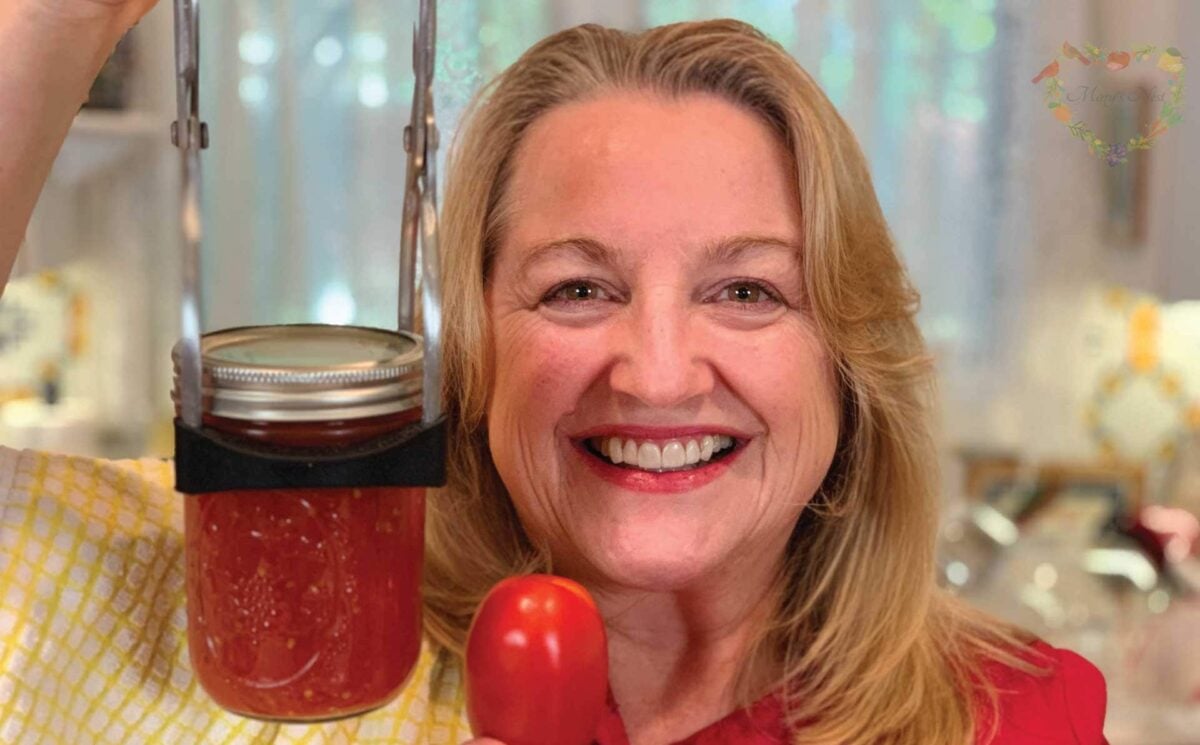
Preserve What You Can
One of the best ways to beat the potential effects of price controls is to preserve your own food. Canning, fermenting, dehydrating, and freezing are all excellent ways to make the most of in-season produce and ensure you have a well-stocked Four Corners Pantry. Whether it’s canning your garden harvest or fermenting some delicious sauerkraut, preserving is a great way to save money and stay prepared.
Here are some example ways to preserve to help you get started:
- Water Bath Canning: Canning Crushed Tomatoes with Water Bath Tutorial
- Fermentation: How to Make Homemade Sauerkraut
- Dehydrating: How to Dehydrate Veggies the Easy Way
A Well Stocked Pantry is Power
Having a well-stocked pantry helps you survive during uncertain times and gives you peace of mind and a sense of control. As modern pioneers, we know that self-reliance empowers us, and our pantry is the heart of our home.
By stocking up and preparing ahead of time, you can face any challenges that come your way, whether it’s price controls, inflation, or just the ups and downs of everyday life.
Prepper Pantry Videos
These videos will help you get started building your Extended or Prepper Pantry or give you additional ideas on what to stock in your existing pantry.
3 Crucial Pantry Questions You Need to Ask
Ask yourself these questions to ensure you have the essentials in your pantry to prepare for emergencies.
The 3 EASY Ways to Lower Preparedness Anxiety
Take these simple steps to ease your “Preparedness Anxiety” and help you feel ready for the unexpected.
10 Essential Prepper Pantry Items to Stock Up On Now
As traditional foods cooks, our pantries are usually well stocked, but did you forget these essential items for complete preparedness?
For a complete list of all the Pantry videos I share, check out the full playlist I have curated for you on how to stock a Four Corners Pantry. These videos and accompanying blog posts provide detailed information and free checklists for stocking an Emergency Pantry, a Survival Pantry, and a Healing Pantry, along with creating a Herbal Medicine Cabinet.
Free Downloads
Download these free checklists and PDF files and add them to your kitchen journal.
How to Make Meal Prep Fast with the Meal-in-a-Bag System
Make meal prep fast and easy with these seven free recipes you can download and print out to create your own Meals in Bags.
The FREE Modern Pioneer Cookbook Curriculum – Teach Traditional Cooking Skills to Grades K-12
This cookbook curriculum gives students a love of traditional foods and kitchen skills that will last them a lifetime.
How To Build Your Great Depression Pantry
Download my free Great Depression Pantry Shopping Guide to identify the Depression Era Foods you need to stock to weather difficult times.
Learn More About Price Controls
To learn more about price controls, what they are, how they have been used here in the United States and around the world, and why they have a downside, check out the following resources:
- Price Controls: Still A Bad Idea
- The Deadly Irony of Price Controls
- Why Price Controls Should Stay in the History Books
Start Your Traditional Foods Journey
Part of my passion for keeping traditional cooking skills alive—in addition to my online cooking school on YouTube—is writing cookbooks. My first book, The Modern Pioneer Cookbook published by Penguin Random House (PRH), is full of my traditional foods recipes that show you how to create a traditional foods kitchen.
Be sure to order your copy of my bestselling book, The Modern Pioneer Cookbook, to start your traditional foods journey. And stay tuned for my next cookbook that will be published by PRH in 2025!
Download Your Free 36-Page Pantry List
For an extensive list of the traditional foods you can make and purchase to stock your pantry, be sure to download my free 36-page Traditional Foods Pantry List. This comprehensive eBook is full of links to recipe videos, helpful articles, and more!
Join the Traditional Foods Kitchen Academy
Are you looking for more traditional foods videos? If so, I invite you to join the Traditional Foods Kitchen Academy. Members of this optional paid YouTube community get access to exclusive videos and other members-only perks. Plus, your YouTube comments include a special members-only badge.
Kitchen Academy Videos
Let’s Talk Akkermansia: A Tiny Helper for Big Gut Health
Discover how Akkermansia muciniphila supports gut and immune health—and how traditional foods help this mighty microbe thrive.
How to Eat a Mediterranean Diet with a Keto Twist
Explore a Mediterranean-Keto twist with a full sample menu focused on healthy fats, quality proteins, and low-carb veggies.
Traditional Foods Kitchen Academy 2025 Member Update
I chat about what’s in store for my Traditional Foods Kitchen Academy in 2025.
Stay in Touch with Mary’s Nest
- Subscribe to My YouTube Channel for Traditional Foods Videos (Free) - When you subscribe, be sure to click on the notification bell that will let you know each time I upload a new video.
- Subscribe to Mary’s Traditional Foods Newsletter (Free) - Get a free 36-page eBook for signing up: How to Stock Your Essential Traditional Foods Four-Corners Pantry.
- Join the Traditional Foods Kitchen Academy - For more detailed videos and exclusive members-only perks, join my YouTube membership community.
- Order The Modern Pioneer Cookbook - Get a hardcover book of Mary's nourishing recipes from a Traditional Foods Kitchen. This bestselling cookbook is published by Penguin Random House with their DK imprint.
- Preorder The Modern Pioneer Pantry - Be one of the first to get Mary's hardcover book about preserving food and making delicious meals from your Four Corners Pantry. Mary's second cookbook is also published by Penguin Random House.
I look forward to having you join me in my Texas Hill Country Kitchen!
Shop for items used in this blog post or video
Favorite Prepper Pantry Supplies
- Wireless Fridge and Freezer Exterior Thermometer
- Life Straw
- Water Disinfection Tablets
- Water BOB Tub Liner
- Cast Iron Trivet
- Tea Lights
- Glass Kettle
- Manual Can Opener
- Battery Powered Can Opener
- 5 Gallon Buckets with Lids
- Gamma Lids – White
- 1 Gallon Mylar Bags
- 500CC Oxygen Absorbers
- All American Pressure Canner
- Stovetop Water Bath Canner
- Long Lasting Ice Packs
- Igloo Cooler
- YETI Cooler
- Electric Cooler
- Jackery Solar Power Station
- Jackery Portable Solar Panels
- 10 Gauge Power Cord
- Kill A Watt EZ
- Hand Crank Flashlight
- High Powered Flashlight
- Hand Crank Emergency Radio
Amazon Shop and Shopping Guide
- Visit Mary’s Nest Amazon Shop
- Visit my Shopping Guide page
Get up to 15% off for stocking your Traditional Foods Pantry and equipping your Modern Pioneer Kitchen, including discounts from US Wellness Meats, Farmhouse Teas, Lehman's, Masontops, Cultures for Health, Survival Garden Seeds, Redmond Real Salt, Plan to Eat, and More!


